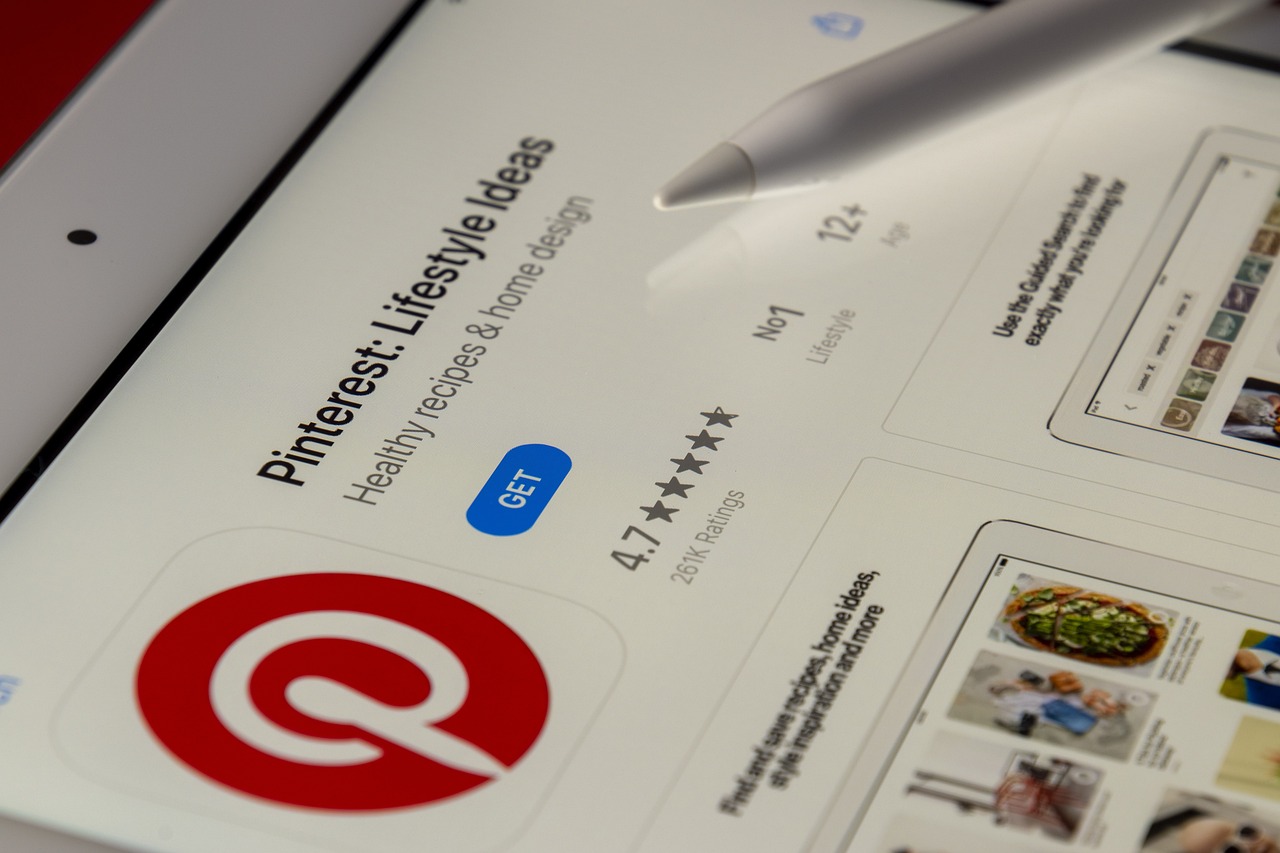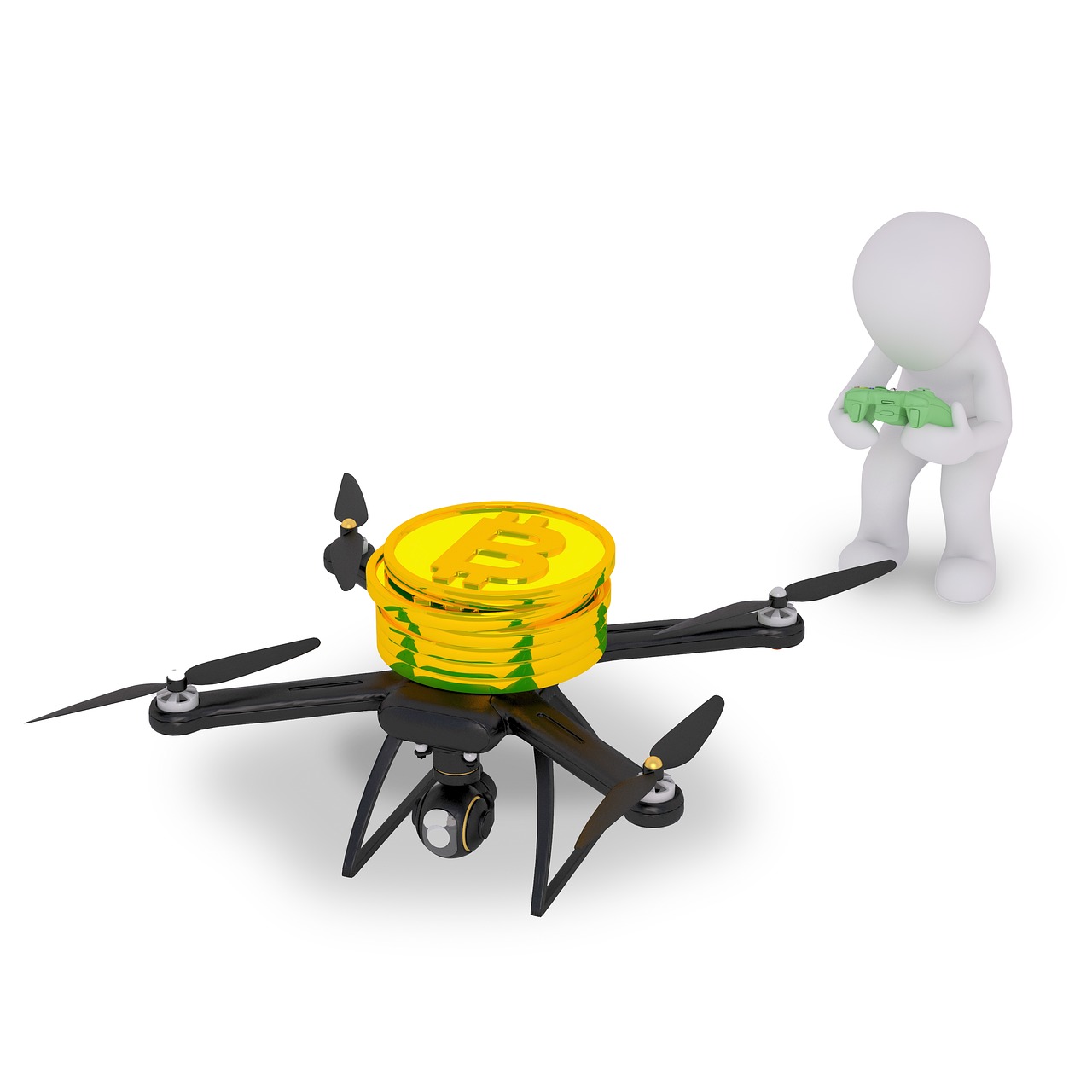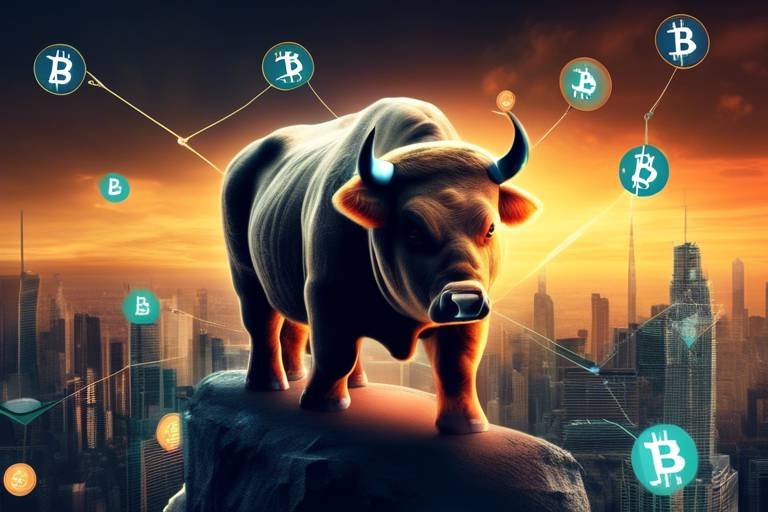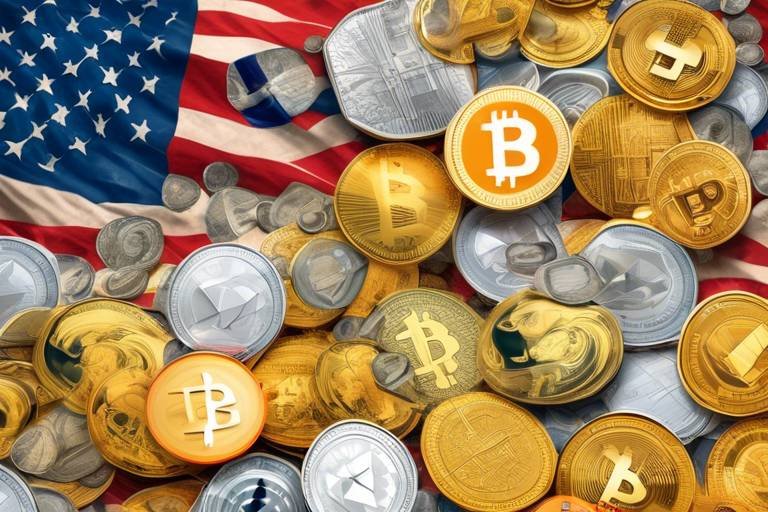Exploring the Rise of Decentralized Social Media Platforms
The digital landscape is undergoing a profound transformation, and at the heart of this evolution is the emergence of decentralized social media platforms. Unlike traditional platforms, which are often controlled by a single entity, decentralized platforms distribute power and control among their users. This shift is not just a technological innovation; it's a movement towards a more democratic and user-centric online environment. As we delve into this fascinating topic, we will explore the myriad benefits these platforms offer, the challenges they face, and the significant implications for user privacy, freedom of expression, and the future of online communication.
Understanding decentralization is crucial for grasping the shift in social media dynamics. At its core, decentralization means that no single entity has control over the entire network. Instead, power is distributed among users, allowing for greater transparency and accountability. This is in stark contrast to traditional social media platforms, where decisions are made behind closed doors, often with little regard for user input or privacy. Imagine a community where every voice matters, where decisions are made collectively rather than dictated by a corporate overlord. That's the promise of decentralized social media.
Decentralized platforms offer numerous advantages that are reshaping the way we interact online. One of the most significant benefits is enhanced user privacy. In a world where data breaches and privacy violations are all too common, decentralized platforms prioritize user data protection. Users have greater control over their personal information, deciding who can access it and how it's used. This empowerment is not just a buzzword; it's a fundamental shift in how we think about our digital identities.
Privacy is a primary concern for many users today. With so much personal information shared online, the need for robust data protection has never been more critical. Decentralized platforms prioritize user privacy by implementing stringent data protection measures. For instance, instead of storing user data on a central server, decentralized platforms use blockchain technology to ensure that data is distributed and encrypted, making it much harder for unauthorized parties to access. This approach not only enhances security but also fosters a sense of trust among users.
When we analyze the privacy policies of decentralized versus centralized platforms, the differences become strikingly clear. Centralized platforms often bury crucial information in lengthy legal jargon, making it difficult for users to understand how their data is being used. In contrast, decentralized platforms tend to be more transparent, providing clear and concise information about data usage. This transparency is a game-changer, as it empowers users to make informed decisions about their online presence.
Decentralization significantly influences user behavior. On traditional platforms, users often feel like mere products, their data harvested for profit. However, on decentralized platforms, users engage with the network differently. They tend to exhibit greater trust and are more willing to participate actively in community governance. This shift in behavior fosters a more vibrant and engaged online community, where users feel valued and heard.
While decentralized social media offers several benefits, it also faces challenges that cannot be overlooked. Scalability is a significant issue; as more users join, maintaining a seamless experience becomes increasingly difficult. Additionally, governance can be complex, as decentralized platforms must find a balance between user autonomy and effective decision-making. There's also the potential for misinformation to spread more easily in an unregulated environment, raising concerns about the integrity of information shared on these platforms.
Effective governance is essential for the success of decentralized platforms. Various governance models have emerged, each with its implications for decision-making and community engagement. For instance, some platforms adopt a democratic voting system, allowing users to have a direct say in important decisions. Others may utilize a more hierarchical approach, where elected representatives make decisions on behalf of the community. Regardless of the model, the goal remains the same: to foster collaboration and accountability among users.
Community-driven governance empowers users to actively participate in decision-making processes. This model encourages collaboration and creates a sense of ownership among users. Imagine being part of a community where your input directly influences the platform's direction. This level of engagement not only strengthens the community but also enhances user satisfaction, as individuals feel their voices matter.
Technical hurdles, such as network stability and user experience, must be addressed for decentralized platforms to thrive. Innovations like sharding and layer-2 solutions are being explored to enhance scalability and performance. Additionally, user-friendly interfaces are crucial in attracting a broader audience. The ongoing evolution of technology in this space is promising, and as solutions emerge, we can expect decentralized platforms to become more robust and accessible.
As decentralized platforms continue to evolve, they may reshape the future of social media. We can speculate on several trends and developments that could define the next generation of online communication. For instance, as users become more aware of their privacy rights, we may see a significant shift away from centralized platforms that exploit user data. Furthermore, the rise of decentralized finance (DeFi) could lead to new monetization models for content creators, allowing them to earn directly from their contributions without relying on advertising revenue.
- What are decentralized social media platforms? Decentralized social media platforms are online networks that distribute control among users rather than centralizing it in a single entity.
- How do decentralized platforms protect user privacy? They use technologies like blockchain to encrypt and distribute user data, giving individuals more control over their information.
- What challenges do decentralized platforms face? Challenges include scalability, governance complexities, and the potential for misinformation.
- How does community-driven governance work? It allows users to participate in decision-making processes, fostering collaboration and accountability.

The Concept of Decentralization
Understanding decentralization is crucial for grasping the shift in social media dynamics. At its core, decentralization refers to the distribution of authority and control away from a central entity. In traditional social media platforms, a single organization, like Facebook or Twitter, governs the rules, algorithms, and user interactions. This centralization allows these platforms to manage content, enforce policies, and monetize user data. However, as users become more aware of their digital footprints, many are questioning whether this model is sustainable or ethical.
Decentralized social media platforms, on the other hand, operate on a fundamentally different premise. Instead of being controlled by a single entity, they leverage technologies like blockchain to distribute power among users. Imagine a community where everyone has a say, rather than a top-down approach where decisions are made in boardrooms. This shift not only enhances user autonomy but also fosters a sense of community and collaboration. Users are no longer just passive consumers; they become active participants in shaping the platform's future.
To illustrate the differences between centralized and decentralized platforms, consider the following table:
| Aspect | Centralized Platforms | Decentralized Platforms |
|---|---|---|
| Control | Single entity governs the platform | Power distributed among users |
| Data Ownership | Data owned and monetized by the platform | Users retain control over their data |
| Censorship | Content moderation by the platform | Community-driven moderation |
| Transparency | Opaque algorithms and policies | Open-source and transparent protocols |
This table highlights some of the fundamental differences that can significantly impact user experience. For instance, in a decentralized environment, users are empowered to make decisions about their content and community guidelines. This empowerment can lead to a more vibrant and diverse online ecosystem, where voices that may have been marginalized on centralized platforms can find a home.
However, it's essential to recognize that decentralization isn't a magic bullet. While it offers exciting opportunities, it also presents unique challenges. The absence of a central authority can lead to issues with governance, content moderation, and user engagement. As we delve deeper into the benefits and challenges of decentralized social media, it becomes clear that understanding this concept is pivotal for anyone looking to navigate the evolving landscape of online communication.

Benefits of Decentralized Social Media
The emergence of decentralized social media platforms is like a breath of fresh air in a world often stifled by the rigid structures of traditional networks. These platforms bring a plethora of benefits that not only enhance user experience but also redefine how we perceive online interactions. Imagine a social media landscape where you have the power to control your data, where censorship is minimized, and where your voice is not just another whisper in the wind. This is the promise of decentralization, and it’s a game changer.
One of the most significant advantages of decentralized platforms is the enhanced user privacy they offer. Unlike centralized networks that often monetize user data, decentralized platforms prioritize user sovereignty. This means that your personal information isn’t sold to the highest bidder. Instead, you retain ownership of your data, deciding who gets to see it and how it’s used. This shift is crucial in a digital age where privacy feels like a luxury rather than a right.
Furthermore, decentralized social media promotes freedom of expression. In traditional platforms, content moderation can sometimes lead to heavy-handed censorship, silencing voices that don’t align with mainstream narratives. However, on decentralized platforms, users are given a broader latitude to express their opinions without the fear of being unjustly banned or moderated. This fosters an environment where diverse perspectives can flourish, leading to more vibrant discussions and a richer social media experience.
Additionally, the concept of community governance plays a pivotal role in these platforms. Users are not just passive consumers; they are active participants in shaping the rules and norms of their online communities. This collaborative approach not only enhances engagement but also builds a sense of ownership among users. When individuals feel that they have a stake in the platform, they are more likely to contribute positively and responsibly.
Another key benefit is the reduction of misinformation. In a decentralized environment, the spread of false information can be mitigated through community oversight and peer accountability. Users can rely on each other to fact-check and verify content, creating a more trustworthy information ecosystem. This is a stark contrast to centralized platforms, where algorithms often prioritize sensational content over factual accuracy.
To sum it up, the benefits of decentralized social media platforms can be encapsulated as follows:
- Enhanced User Privacy: Users control their data, reducing the risk of exploitation.
- Freedom of Expression: A wider range of voices and opinions can be shared without fear of censorship.
- Community Governance: Users actively participate in decision-making processes, fostering engagement.
- Reduction of Misinformation: Peer accountability helps in verifying content, leading to a more informed user base.
As we continue to navigate the digital landscape, the rise of decentralized social media platforms signifies a shift towards a more democratic and user-centric approach to online communication. It’s an exciting time to be part of this evolution, where every user can become a stakeholder in the digital world.
Q: What are decentralized social media platforms?
A: Decentralized social media platforms are networks that operate without a central authority, allowing users to maintain control over their data and interactions.
Q: How do decentralized platforms enhance user privacy?
A: These platforms allow users to own their data and decide how it is shared, reducing the risk of data exploitation by third parties.
Q: Can I express my opinions freely on decentralized platforms?
A: Yes, decentralized platforms typically allow for greater freedom of expression, with less risk of censorship compared to traditional networks.
Q: How does community governance work?
A: Community governance involves users participating in decision-making processes, which helps shape the platform's rules and policies collaboratively.
Q: Is misinformation a problem on decentralized platforms?
A: While misinformation can occur, decentralized platforms often have mechanisms for peer accountability that help verify content and reduce its spread.

User Privacy and Data Control
In today's digital age, user privacy and data control have become paramount concerns for individuals navigating the vast landscape of social media. With the rise of decentralized platforms, users are finding themselves in a unique position where they can reclaim ownership of their personal information. Unlike traditional social media platforms, which often operate on a centralized model where data is stored and controlled by a single entity, decentralized platforms distribute data across a network. This shift empowers users to manage their information more effectively and securely.
Imagine your personal data as a treasure chest. In a centralized model, this chest is kept under lock and key by a single gatekeeper, who has the power to decide who can access it and how it can be used. On the other hand, decentralized platforms allow you to keep that treasure chest with you, granting you the keys to your own data. This means you can choose who gets to see your valuable information and for what purpose. This level of control significantly enhances user privacy, as individuals can engage on their own terms without the fear of unwanted surveillance or data exploitation.
Moreover, decentralized platforms often utilize advanced cryptography and blockchain technology, which add layers of security to user data. For instance, users can encrypt their information, making it nearly impossible for unauthorized parties to access it. This is a game-changer in a world where data breaches and privacy violations have become all too common. The enhanced security measures not only protect personal data but also build trust among users, encouraging more open and honest interactions.
However, with great power comes great responsibility. While users gain control over their data, they must also be vigilant about how they handle it. Many decentralized platforms provide tools and resources to help users understand their privacy settings and manage their data effectively. For example, users can often adjust their visibility settings, choose what information to share, and even delete their data permanently if they decide to leave the platform. This level of transparency is a refreshing change from the opaque practices of many centralized platforms.
To illustrate the differences between user privacy policies in decentralized versus centralized platforms, consider the following table:
| Aspect | Centralized Platforms | Decentralized Platforms |
|---|---|---|
| Data Ownership | Owned by the platform | User-owned |
| Data Access | Controlled by the platform | User-controlled |
| Privacy Policies | Often vague and complex | Transparent and user-friendly |
| Security Measures | Variable, often reactive | Proactive, using cryptography |
As we continue to explore the evolving landscape of social media, it's clear that decentralized platforms are paving the way for a future where user privacy and data control are prioritized. By placing the power back into the hands of the users, these platforms are not just changing how we interact online; they are redefining the very essence of digital communication. So, as you engage with these new platforms, remember that your data is your treasure, and you hold the keys.
- What are decentralized social media platforms? Decentralized social media platforms are online networks that distribute data across a network, allowing users to have greater control over their personal information.
- How do decentralized platforms enhance user privacy? They empower users to manage their data, use encryption, and provide transparency in privacy policies, thus protecting user information from unauthorized access.
- What should users be cautious about on decentralized platforms? While users have more control, they must be vigilant in managing their data and understanding their privacy settings to ensure their information remains secure.

Comparing Privacy Policies
When it comes to social media, the privacy policies of platforms can feel like a maze. Traditional centralized platforms often have privacy policies that resemble a lengthy legal document, filled with jargon that can leave users scratching their heads. These policies usually grant the platform broad rights over user data, allowing them to collect, store, and share information with third parties for various purposes, including targeted advertising. In contrast, decentralized platforms aim to flip this script, placing the power back into the hands of the users.
Decentralized social media platforms typically emphasize transparency and user control. They often provide clear guidelines on how user data is handled, making it easier for individuals to understand their rights. For instance, many decentralized platforms allow users to own their data, meaning they can decide who accesses it and how it's used. This fundamental shift is not just about privacy; it's about empowering users to take charge of their online identities.
To illustrate the differences, let’s take a closer look at some key aspects of privacy policies from both types of platforms:
| Aspect | Centralized Platforms | Decentralized Platforms |
|---|---|---|
| Data Ownership | Platform owns user data | Users own their data |
| Data Sharing | Often shares data with third parties | Limited or no third-party sharing |
| Transparency | Complex and lengthy policies | Clear and concise policies |
| User Control | Minimal control over personal data | Full control over personal data |
As you can see, the contrast is striking. Users on decentralized platforms can enjoy a sense of security knowing that their data isn't being exploited for profit. However, it’s important to note that not all decentralized platforms are created equal. Some may still have loopholes or unclear policies, so it's crucial for users to do their due diligence before diving in.
Moreover, the impact of these privacy policies goes beyond individual users. They shape the overall culture of online communication. When users feel secure and in control, they are more likely to engage authentically and openly. This can foster a vibrant community where ideas flourish without the fear of constant surveillance or data misuse.
In conclusion, as we compare the privacy policies of centralized and decentralized platforms, it's clear that the latter offers significant advantages in terms of user empowerment and data protection. As the digital landscape continues to evolve, understanding these differences will be essential for users who value their privacy and seek a more transparent online experience.

Impact on User Behavior
The rise of decentralized social media platforms has truly transformed the way users engage and interact online. Unlike traditional centralized platforms, where algorithms dictate what content you see and how you connect with others, decentralized platforms foster a more authentic and organic environment. This shift can be likened to moving from a crowded, noisy bar where the DJ controls the music to a cozy gathering where everyone gets to share their favorite songs. In this new space, users feel a greater sense of ownership and agency over their interactions.
One significant change in user behavior is the increased trust among community members. On decentralized platforms, users often have more transparency regarding how their data is used and how decisions are made. This transparency encourages a culture of accountability, where users are more likely to engage constructively rather than resorting to negative behaviors like trolling or spreading misinformation. When users feel safe and valued, they are more inclined to participate actively in discussions and share their thoughts freely.
Moreover, decentralized platforms tend to cultivate a stronger sense of community. Users are more likely to connect with like-minded individuals, leading to deeper conversations and more meaningful relationships. This is particularly important in a time when many people feel isolated due to the pandemic and other global challenges. In a decentralized environment, individuals can carve out their own spaces, join niche communities, and share their passions without the limitations imposed by centralized platforms.
However, it’s important to note that the shift to decentralization also brings about changes in user behavior that can be challenging. For instance, the absence of a central authority can lead to a lack of moderation, resulting in the proliferation of harmful content. Users may find themselves navigating a landscape where misinformation can spread just as easily as valuable insights. This duality means that while users may feel empowered, they also need to be more vigilant about the information they consume and share.
To illustrate this impact further, let’s consider some key behavioral changes observed on decentralized platforms:
- Increased Engagement: Users tend to spend more time on platforms where they feel their voices are heard and valued.
- Collaborative Content Creation: Users are more willing to co-create content, leading to innovative ideas and projects.
- Heightened Awareness: Users become more aware of their digital footprint and the implications of sharing personal data.
Ultimately, the impact of decentralized social media on user behavior is profound. It encourages a more engaged, responsible, and community-oriented approach to online interactions. As these platforms continue to develop, we can expect to see even more exciting changes in how we communicate and connect with one another.
Q: What are decentralized social media platforms?
A: Decentralized social media platforms are networks that operate without a central authority, allowing users to have more control over their data, content, and interactions.
Q: How do decentralized platforms ensure user privacy?
A: These platforms prioritize user privacy by implementing robust data protection measures and allowing users to manage their own information without third-party interference.
Q: What challenges do decentralized platforms face?
A: Challenges include scalability, governance issues, and the potential for misinformation due to the lack of centralized moderation.
Q: Will decentralized social media replace traditional platforms?
A: While decentralized platforms are gaining popularity, it’s unlikely they will completely replace traditional platforms. Instead, they will coexist, offering users more choices in how they engage online.

Challenges of Decentralized Platforms
While the allure of decentralized social media platforms is undeniable, they are not without their challenges. One of the most pressing issues is scalability. As more users flock to these platforms, the infrastructure must be robust enough to handle increased traffic without compromising performance. Traditional centralized platforms have the advantage of centralized control, allowing them to easily scale resources. In contrast, decentralized networks often rely on a peer-to-peer architecture, which can struggle to maintain speed and reliability as user numbers grow.
Another significant challenge is governance. In a decentralized environment, decision-making can become convoluted. Without a central authority, establishing rules and resolving disputes can be difficult. Different governance models, such as community-driven governance, can lead to varied outcomes. For instance, while some users may appreciate having a voice in the platform's direction, others might find the process frustrating and inefficient. The balance between democracy and efficiency is a tightrope walk that many decentralized platforms are still trying to master.
Moreover, the potential for misinformation is a growing concern. Decentralized platforms often lack the stringent content moderation policies that centralized platforms enforce. This absence can lead to the rapid spread of false information, which can be detrimental to users and society at large. Without a reliable mechanism for verifying content, users may find themselves navigating a minefield of misinformation, which can erode trust in the platform.
In addition to these challenges, there is the issue of user experience. Many decentralized platforms are still in their infancy, meaning that the interfaces and functionalities may not be as polished as those of established centralized platforms. Users accustomed to seamless experiences may be deterred by clunky interfaces or slow load times. This can create a barrier to entry for new users who might be hesitant to engage with a platform that feels less user-friendly.
Lastly, security remains a critical concern. While decentralization can enhance privacy by reducing the amount of user data held by a single entity, it also introduces new vulnerabilities. For example, decentralized platforms can be susceptible to attacks that exploit their distributed nature. Users must be vigilant about their security practices, as the responsibility for safeguarding personal data often falls more heavily on them in a decentralized context.
In summary, the challenges facing decentralized social media platforms are multifaceted, ranging from scalability and governance to misinformation, user experience, and security. Addressing these issues will be crucial for the long-term success of these platforms and their ability to provide a viable alternative to traditional social media.
- What are decentralized social media platforms?
- How do decentralized platforms ensure user privacy?
- What are the main challenges of decentralized social media?
- Can decentralized platforms compete with centralized ones?
Decentralized social media platforms operate on a peer-to-peer network, allowing users to connect directly without a central authority. This structure promotes user control and privacy.
Decentralized platforms prioritize user privacy by minimizing data collection and giving users control over their personal information. They often use encryption and other security measures to protect data.
Challenges include scalability, governance issues, misinformation, user experience, and security vulnerabilities. Addressing these is essential for the platforms' growth and user trust.
While they offer distinct advantages, such as enhanced privacy and reduced censorship, decentralized platforms must overcome significant challenges to compete effectively with established centralized platforms.

Governance Models in Decentralized Platforms
Effective governance is the backbone of any successful platform, and when it comes to decentralized social media, the stakes are even higher. Unlike traditional platforms, where a single entity holds the reins, decentralized platforms rely on a variety of governance models that empower users and foster community engagement. This shift not only democratizes decision-making but also enhances the overall user experience. Imagine a bustling marketplace where every vendor has a say in how things are run; this is the essence of decentralized governance.
One of the most intriguing aspects of decentralized governance is the diversity of models that exist. Each model offers unique advantages and challenges, reflecting the values and priorities of the community it serves. For instance, some platforms operate on a token-based voting system, where users can stake tokens to vote on important decisions. This system not only incentivizes participation but also aligns the interests of users with the health and growth of the platform. On the other hand, some platforms adopt a more consensus-driven approach, where decisions are made collectively by community members through discussions and proposals. This model promotes transparency and encourages collaboration, but it can also lead to slower decision-making processes.
To illustrate the various governance models, consider the following table:
| Governance Model | Description | Advantages | Challenges |
|---|---|---|---|
| Token-Based Voting | Users stake tokens to vote on decisions. | Incentivizes participation; aligns interests. | Potential for token hoarding; unequal influence. |
| Consensus-Driven | Decisions made collectively through discussions. | Promotes transparency; encourages collaboration. | Slower decision-making; potential for gridlock. |
| Delegated Governance | Users elect representatives to make decisions. | Streamlined decision-making; expert input. | Risk of misalignment with community interests. |
In addition to these models, community-driven governance plays a crucial role in shaping the future of decentralized platforms. By allowing users to actively participate in decision-making processes, platforms can cultivate a sense of ownership and responsibility among their members. This model not only enhances accountability but also fosters a vibrant community where users feel valued and heard. Think of it as a potluck dinner where everyone brings a dish to share; the more diverse the contributions, the richer the experience for everyone involved.
However, implementing effective governance in decentralized platforms is not without its challenges. Issues such as scalability, security, and user experience must be carefully considered. As the platform grows, maintaining a cohesive governance structure can become increasingly complex. Moreover, ensuring that all voices are heard, especially in larger communities, can be a daunting task. Innovative solutions, such as automated governance tools and AI-driven moderation, are being explored to tackle these challenges and streamline the decision-making process.
As we look to the future, the evolution of governance models in decentralized social media will likely play a pivotal role in shaping online interactions. The balance between user empowerment and effective decision-making will be crucial in determining the success of these platforms. Just as a well-tuned orchestra relies on each musician to play their part, decentralized platforms need their communities to engage actively in governance to create a harmonious online environment.
- What is decentralized governance? Decentralized governance refers to decision-making processes that involve community participation rather than a centralized authority.
- How do token-based voting systems work? In token-based voting, users stake tokens to influence decisions, allowing them to have a say proportional to their stake.
- What are the challenges of decentralized governance? Challenges include scalability, ensuring all voices are heard, and maintaining user engagement in decision-making.
- Can decentralized platforms prevent misinformation? While decentralized governance can empower communities to moderate content, it also requires active participation and vigilance from users.

Community-Driven Governance
Community-driven governance is a revolutionary concept that empowers users in decentralized social media platforms to take the reins of decision-making. Imagine a bustling town square where everyone has a voice, and every opinion counts. In this digital realm, users aren't just passive consumers of content; they are active participants in shaping the platform's future. This model fosters a sense of ownership and accountability, making users feel more connected to the platform and each other.
One of the most compelling aspects of community-driven governance is its ability to promote transparency. In traditional social media, decisions are often made behind closed doors, leaving users in the dark about how their data is used or why certain content is moderated. However, in a decentralized environment, the decision-making processes are often open and accessible. Users can see how policies are formed, who is making them, and even participate in discussions that influence these decisions. This transparency not only builds trust but also encourages users to engage more actively.
Moreover, community-driven governance can lead to a more diverse range of perspectives being considered. Since users from various backgrounds and experiences contribute to the decision-making process, the outcomes are likely to reflect a broader spectrum of ideas. This diversity is crucial in creating a platform that caters to the needs of all its users, rather than just a select few. For instance, when community members vote on new features or policies, they can address issues that may not have been on the radar of the platform's original creators.
However, it’s essential to recognize that community-driven governance is not without its challenges. The process can sometimes lead to conflicts or disagreements among users. Imagine a lively debate in that town square—while it’s great for democracy, it can also become chaotic. To mitigate this, many platforms implement structured voting systems or consensus mechanisms to ensure that decisions are made fairly and efficiently. These systems help balance the diverse opinions and ensure that everyone's voice is heard while still moving forward with necessary changes.
In essence, community-driven governance transforms users into stakeholders, creating a vibrant ecosystem that thrives on collaboration. It’s not just about making decisions; it’s about building a community where every member feels valued and heard. As decentralized platforms continue to grow, this model will likely become a cornerstone of their success, ensuring that they remain responsive to the needs of their users.
- What is community-driven governance?
Community-driven governance refers to a model where users actively participate in decision-making processes on decentralized platforms, allowing for greater transparency and accountability.
- How does it benefit users?
This model empowers users by giving them a voice in shaping policies and features, fostering a sense of ownership and community engagement.
- What challenges does it face?
Challenges include potential conflicts among users and the need for structured processes to ensure fair decision-making.
- Can it lead to better outcomes?
Yes, by incorporating diverse perspectives, community-driven governance can create solutions that better reflect the needs of all users.

Technical Challenges and Solutions
In the ever-evolving landscape of decentralized social media, technical challenges pose significant hurdles that must be overcome for these platforms to reach their full potential. One of the primary concerns is network stability. Unlike centralized platforms that rely on robust data centers, decentralized networks depend on a multitude of nodes spread across various geographical locations. This distribution can lead to inconsistencies in connectivity and performance. Imagine trying to have a conversation in a crowded room where everyone is talking at once; it can get chaotic! The same goes for decentralized networks where the flow of information can become disrupted.
Another challenge is the user experience. Many decentralized platforms are still in their infancy, which means their interfaces may not be as polished or intuitive as those of established social media giants. Users can feel overwhelmed by the lack of familiar features or the complexity of navigating these new environments. It's akin to switching from a luxury car to a vintage model; the charm is there, but the ride can be bumpy!
To tackle these challenges, developers are actively working on several solutions. For instance, improving protocols can enhance network stability. By implementing more efficient consensus mechanisms, such as Proof of Stake or Delegated Proof of Stake, decentralized platforms can ensure that transactions and communications are processed more smoothly. These methods not only improve speed but also reduce the energy consumption associated with traditional mining processes.
Moreover, enhancing user interfaces is crucial for attracting and retaining users. Developers are focusing on creating more user-friendly designs that simplify the onboarding process. This involves incorporating familiar social media features while maintaining the core principles of decentralization. Think of it as updating an old classic car with modern technology while keeping its vintage appeal intact.
Additionally, community engagement plays a vital role in addressing these technical challenges. By fostering a collaborative environment, users can contribute to the development and improvement of the platform. This community-driven approach not only helps in identifying issues but also encourages users to take ownership of the platform. After all, when users feel invested, they are more likely to stick around and contribute positively.
In summary, while technical challenges present significant obstacles for decentralized social media platforms, innovative solutions and community involvement can pave the way for a brighter future. As these platforms continue to evolve, they promise to offer a user experience that is both enjoyable and empowering, allowing individuals to reclaim control over their online interactions.
- What are decentralized social media platforms? These platforms operate without a central authority, allowing users to communicate and share content directly with one another.
- How do decentralized platforms protect user privacy? They often use encryption and allow users to control their data, minimizing the risk of unauthorized access.
- What are the main challenges faced by decentralized social media? Key challenges include network stability, user experience, and governance issues.
- Can decentralized platforms compete with established social media? Yes, by offering unique benefits like enhanced privacy and user control, they can attract users looking for alternatives.

The Future of Social Media
The landscape of social media is poised for a dramatic transformation as decentralized platforms continue to gain traction. Imagine a world where users are not just passive consumers of content, but active participants in shaping their online environments. This shift is not merely a trend; it's a movement towards a more empowered and engaged digital society. As we look ahead, several trends and developments are likely to define the next generation of online communication.
One of the most significant changes we can anticipate is the increasing emphasis on user autonomy. Decentralized social media platforms inherently prioritize the rights and freedoms of their users. Unlike traditional platforms, where a handful of executives dictate policies and algorithms, decentralized networks allow users to have a say in how their communities operate. This could lead to a more democratic approach to content moderation, where users collectively decide what is acceptable and what isn't, fostering a sense of ownership and responsibility.
Moreover, the integration of blockchain technology is set to revolutionize how we interact online. Blockchain can provide transparent and immutable records of user interactions, ensuring that data privacy is not just a promise but a reality. Imagine being able to verify the authenticity of information without relying on a central authority. This could drastically reduce the spread of misinformation, as users would have access to verifiable sources and data. In a world where trust is increasingly hard to come by, this could be a game-changer.
Another trend to watch is the rise of niche communities. As decentralized platforms allow for more tailored experiences, we may see a proliferation of smaller, focused communities that cater to specific interests and demographics. This could lead to a more enriching social media experience, where users can connect with like-minded individuals and engage in meaningful conversations. Instead of being bombarded by a constant stream of content, users will have the ability to curate their feeds according to their preferences, creating a more personalized experience.
However, the future of social media is not without its challenges. As these platforms grow, they will need to address issues related to scalability and governance. How do you maintain a sense of community in a rapidly expanding network? What mechanisms can be put in place to ensure fair decision-making? The answers to these questions will be crucial in determining the success of decentralized platforms.
In conclusion, the future of social media is bright but complex. As we move towards a more decentralized model, we can expect a shift in power dynamics, enhanced user privacy, and a greater emphasis on community-driven governance. While challenges remain, the potential for a more equitable and engaging online landscape is within our grasp. The question is, are we ready to embrace this change?
- What is decentralized social media? Decentralized social media refers to platforms that distribute control and ownership among users rather than a central authority, promoting user autonomy and data privacy.
- How does blockchain technology enhance social media? Blockchain provides transparency and security, allowing users to verify information and maintain control over their data, reducing the risk of misinformation.
- What are the benefits of niche communities? Niche communities allow users to connect with like-minded individuals, fostering more meaningful interactions and tailored content experiences.
- What challenges do decentralized platforms face? Key challenges include scalability, governance, and ensuring fair decision-making as the platforms grow.
Frequently Asked Questions
- What are decentralized social media platforms?
Decentralized social media platforms are online networks that operate without a central authority. Instead of relying on a single company to control user data and content, these platforms distribute power among users, allowing for greater autonomy and privacy.
- How do decentralized platforms enhance user privacy?
Decentralized platforms prioritize user privacy by giving individuals control over their own data. Users can choose what information to share and with whom, reducing the risk of data exploitation by third parties.
- What are the main benefits of using decentralized social media?
Some key benefits include enhanced user privacy, reduced censorship, and greater control over personal data. Users can engage more freely without the fear of their content being unfairly moderated or removed.
- Are there any challenges associated with decentralized social media?
Yes, decentralized platforms face challenges such as scalability issues, governance complexities, and the potential spread of misinformation. These challenges need to be addressed for these platforms to be effective and sustainable.
- How does governance work in decentralized social media?
Governance in decentralized platforms often relies on community-driven models, where users participate in decision-making processes. This fosters collaboration and accountability, allowing the community to shape the platform's future.
- Can decentralized platforms prevent misinformation?
While decentralized platforms can implement measures to combat misinformation, the lack of a central authority makes it challenging to enforce rules consistently. Community engagement and user education play vital roles in addressing this issue.
- What does the future hold for decentralized social media?
The future of decentralized social media looks promising, with trends indicating increased user adoption and technological advancements. As more users prioritize privacy and autonomy, these platforms may redefine online communication.



















